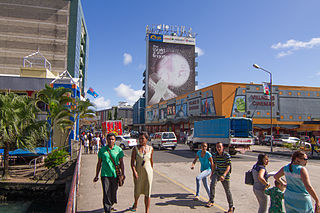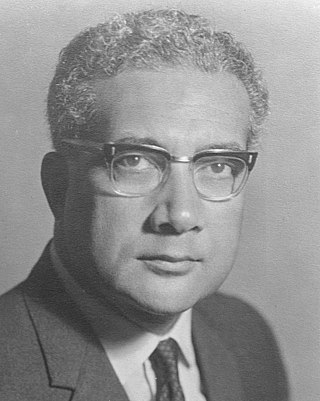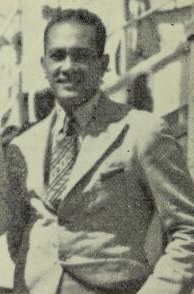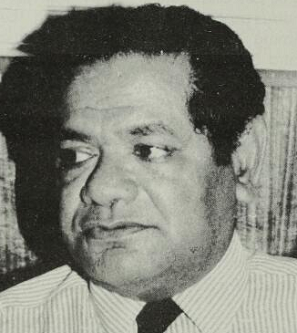
Suva is the capital and largest city of Fiji. It is the home of the country's largest metropolitan area and serves as its major port. The city is located on the southeast coast of the island of Viti Levu, in Rewa Province, Central Division.

RatuSir Kamisese Mara, was a Fijian politician, who served as Chief Minister from 1967 to 1970, when Fiji gained its independence from the United Kingdom, and, apart from one brief interruption in 1987, the first Prime Minister from 1970 to 1992. He subsequently served as president from 1993 to 2000.

Articles about people, places, things, and concepts related to or originating from Fiji, include:

RatuSir Penaia Kanatabatu Ganilau was a Fijian politician who served as the first President of Fiji, serving from 8 December 1987 until his death in 1993. He had previously served as Governor-General of Fiji, representing Elizabeth II, Queen of Fiji, from 12 February 1983 to 15 October 1987.

RatuSeru Epenisa Cakobau was a Fijian chief, monarch, and warlord (Vunivalu) who united part of Fiji's warring tribes under his leadership, establishing a united Fijian kingdom. He was born on Natauloa, Nairai Island in Lomaiviti but spent his youth on Vanuaso, Gau, Lomaiviti, later returning to Bau to re-establish his Father's Ratu Tanoa Visawaqa reign. Ratu Epenisa Seru Visawaqa was given the name "Cakobau" meaning destroyer of Bau, in reference to his grandfathers' (Nailatikau) effort to first claim the tile from the people of Butoni and Lovoni, returned with most of his warriors from Vanuaso, Gau, Lomaiviti to coup the leadership in Bau then and later takeover his father's title; known after his father as the 6th "Vunivalu" or Warlord of Bau.

Filipe Nagera Bole CBE, CF was a Fijian politician who hailed from the village of Mualevu on the island of Vanua Balavu in the Lau Group. He had a reputation as one of Fiji's few politicians untainted by scandal, and was noted for his moderate views. In October 2003, he endorsed calls for an end to racially segregated voting, saying that electing all members of the House of Representatives by universal suffrage would make voters and politicians think of the common national good, rather than communal interests.
Sir Vijay Raghubar Singh, KBE was an Indo-Fijian lawyer and politician who held Cabinet office in the 1960s and 1970s. Vijay Singh served in Prime Minister Ratu Sir Kamisese Mara's government in a variety of positions, including Attorney-General, and was president of the Indian Alliance, a division of the ruling Alliance Party. He quit the party in 1979 following disagreement with Alliance leadership and later joined the opposition National Federation Party. Vijay Singh was involved in the restructure of the Fiji sugar industry and was a leading member of the Jaycees movement in Fiji.
Qoriniasi Babitu Bale was a barrister, a solicitor and a politician who served twice as Fiji's Minister for Justice and Attorney-General, most recently from 2001 to 2006, when he was deposed in the military coup of 5 December. Like many of Fiji's most influential leaders, Bale was a native of Levukana Village in Vanua Balavu in the Lau Islands.

RatuSir Edward Tuivanuavou Tugi Cakobau was a Fijian chief, soldier, politician and cricketer. He was a member of the Fijian legislature from 1944 until his death, also serving as Minister for Commerce, Industry and Labour and Deputy Prime Minister. During the 1940s he made two appearances for the Fiji national cricket team.
Kunwar Bachint Singh was an Indo-Fijian teacher and politician. He arrived in Fiji in 1927 as a teacher for the Arya Samaj but his association with Vishnu Deo led him to play an active role in aggressively promoting the Arya Samaj and finally into politics. He was elected into the Legislative Council as a protégé of Vishnu Deo but after the election took an independent stance opposed to the wishes of the majority of the Indo-Fijians. He supported nominated rather than elected representation, actively supported the war effort and even attempted to set up a farmers union opposed to a number of existing unions. The Government rewarded him for his loyalty by nominating him into the Legislative Council three times, appointing him as a Justice of the Peace and as the first Indo-Fijian member of the Executive Council.
AdiLaufitu Malani (1958-2017) was a Fijian chief and politicians. She was a former medical assistant, a former Director of UNIFEM Pacific office and a political leader. She served as a Senator from June to December 2006, when the Senate was dissolved in the wake of the military coup of 5 December.
Taukei ni Waluvu is a Fijian phrase for "Owner of the Flood." It is the traditional chiefly title of the warrior hill clan Siko-Natabutale of Nairukuruku village. The history of the clan from the mid- nineteenth century, represent the social structures of the chiefly system, religion and western culture that supported colonialism in Fiji. Tradition, Christianity and British indirect rule were combined to legitimize what was accepted as the right way to govern. Condemned by some modern day critics as exploitative, the Fijian chiefly system was the medium of native social interdependence and a traditional contract shared by the indigenous clans of pre-colonial Fiji, that was utilized for colonial rule. Since Independence the chiefly system has had to adapt to the demands of modernity. Anthropologist Arthur Capell in his study of early tribal migration within Fiji made the point that, "the history of Fiji is the history of chiefly families." The phrase in fact emphasized the hierarchical nature of Fijian traditional society where chiefly power was held sacred. The relationship between Chiefs and Westerners in especially Missionaries thus became a focal point for gathering insight into Fijian culture and tradition in the nineteenth century. James Turner a latter anthropologist found, "The chiefly families of Nairukuruku were the first in the eastern highlands of Viti Levu to declare their allegiance to the central government and as a result of this support their influence expanded throughout the area".

Charles Walker was a Fijian civil servant and Alliance Party politician and diplomat.
RatuJione Atonio Rabici "Tom" Doviverata was a Bau chief and medical doctor and administrator in colonial Fiji.
In Fiji, Turaga na Roko Tui Bau is a vassal chief of the Vunivalu of Bau. From his seat at the residence of Naicobocobo, the Roko Tui Bau rules the Vusaratu chiefs and has relationships with the Roko Tui Dreketi, Ratu Mai Verata, Roko Tui Namata, Roko Tui Veikau, Tui Vuya and other members of Fiji's House of Chiefs.
Sir John Neil Falvey, KBE, QC was a New Zealand-born Fijian lawyer, who served as Attorney General of Fiji from 1970 to 1977. Previously, he had served as legal adviser to the Fijian Affairs Board.
RatuTiale Wimbledon Thomas Vuiyasawa was a Fijian chief, civil servant and politician. He served as a member of the Legislative Council and Senate.
RatuSirJone Latianara Kikau was a Fijian chief, civil servant and politician. He served as a member of the Senate from 1973 to 1979.

Mosese Qionibaravi was a Fijian chief, civil servant and politician. He served as a member of the House of Representatives from 1973 until his death, also holding the offices of Speaker of the House, Minister of Foreign Affairs, Tourism and Finance, and Deputy Prime Minister.









